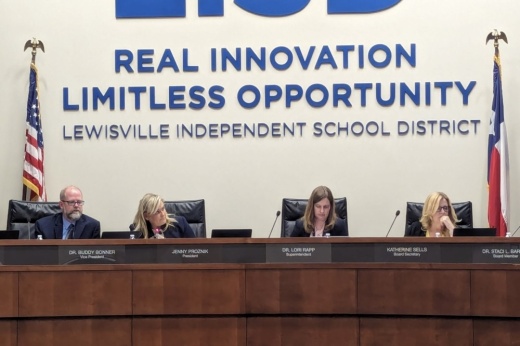Measures include removing double block periods for English Language Arts classes at all middle schools, examining low-enrollment electives to ensure programming efficiency and rightsizing facilities to align with dipping enrollment, according to district documents.
Taking these efforts into consideration, LISD officials estimated next year’s budget shortfall at around $8 million, Superintendent Lori Rapp said at a May 13 meeting.
“Funding levels for public schools are not at an all-time high despite claims of people around the state of Texas,” Rapp said.
The backstory
The 88th Legislature’s inaction regarding school funding has left a trail of budget shortfalls across the state. The state allots school districts $6,160 per student who meets the average daily attendance threshold, an amount that has not increased since 2019.
In a May 13 letter to Gov. Greg Abbott, state Rep. Jon Rosenthal and 39 representatives who signed the letter implored him to call an additional special session to increase basic and school safety funding. In the state budget, $5 billion remains unspent for public education, along with a surplus projected to grow to $21.3 billion by the next legislative session, according to the letter.
The governor responded to the representatives in a letter stating House Bill 1 would have included a $6 billion public school funding package that would have increased the basic allotment had the representatives not voted against the bill last year. However, the bill also included a voucher program that would allocate money for Texans to send their children to private schools, a requisite for public school districts to receive the funding.
Public school officials argued this would divert money away from public schools.
The details
Abbott asserted in his letter that school districts receive upwards of $12,000 per student from the state in totality.
This could be a misleading figure, Rapp said at a May 6 board workshop. To arrive at that amount, the state is including bond funds; retirement plan funds; tax revenue from voter-approval tax rate elections; and Elementary and Secondary School Emergency Relief funds, a COVID-19 relief program that is set to expire this fall, according to the Texas Education Agency.
These revenue streams vary per district and do not apply in certain cases, Rapp said. Some districts may pass multiple bonds, and others may not pass any, and tax rates may fluctuate, meaning the $12,000 figure is arbitrary. The only funding equally guaranteed statewide is the basic allotment, she said. Additionally, money from bonds and retirement plans cannot be spent on expenses such as teacher raises, which the district has been discussing despite the shortfall.
Zooming in
The board of trustees discussed staff salary increases at the May 13 meeting. The district is considering a midpoint percentage raise or a one-time payment, Rapp said. A midpoint salary is the middle point in a salary range of a particular pay grade, usually between the highest and lowest salaries.
District officials presented the board with two compensation options. The first option would be a midpoint raise between 1% and 4%, which would cost between $4 million and $16 million, respectively, according to district documents. A 1% midpoint raise would be around a $655 annual increase per teacher.
The second option would be a one-time payment of either $500 or $1,000 for all staff members at a total cost of $3.5 million and $7 million, respectively, or $1,000 for teachers and $500 for all other staff at a total of $5.5 million.
If approved, the total cost of the chosen option would be added to the budget shortfall, Rapp said.
Going forward
Given the pending financial shortfall in FY 2024-25, the board elected to delay approving the raises. The compensation adjustments will only be approved after a financial audit this fall can better determine the district’s fiscal bearings, trustee Buddy Bonner said.
“We want to do so much more for our teachers because we understand they’re the backbone of this district, and we wish we could do something right now,” trustee Sheila Taylor said.
District officials will bring forward a preliminary resolution for the board to preview in June. The board will consider approval for a final compensation plan in August.





